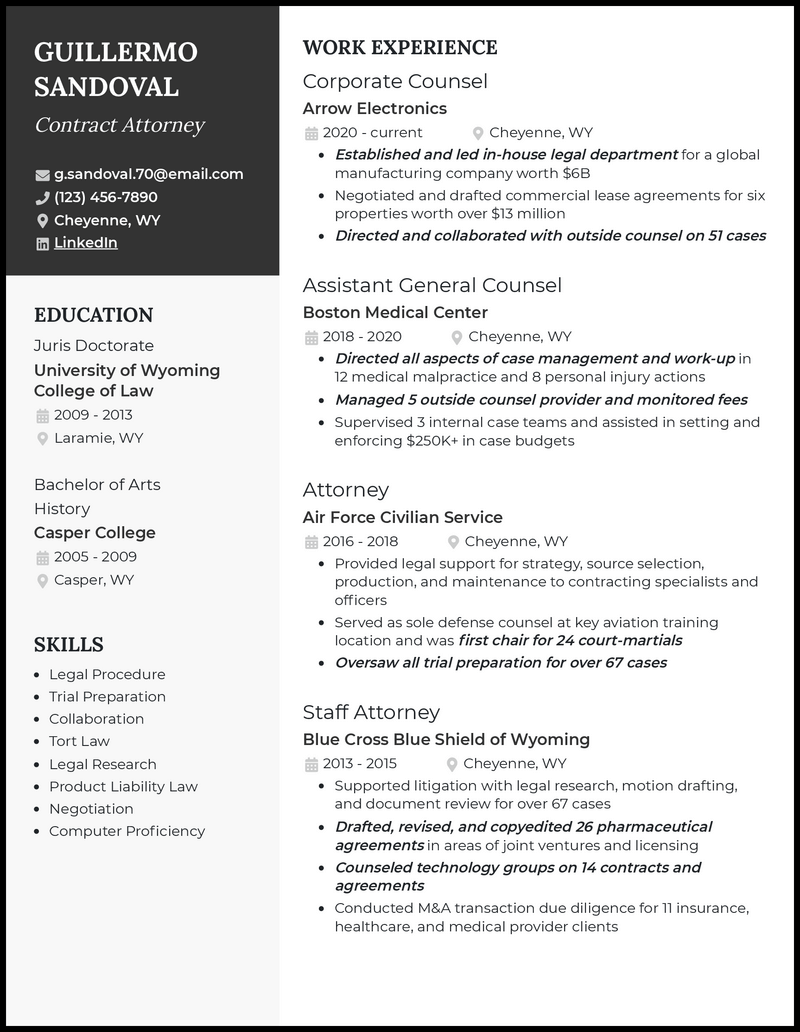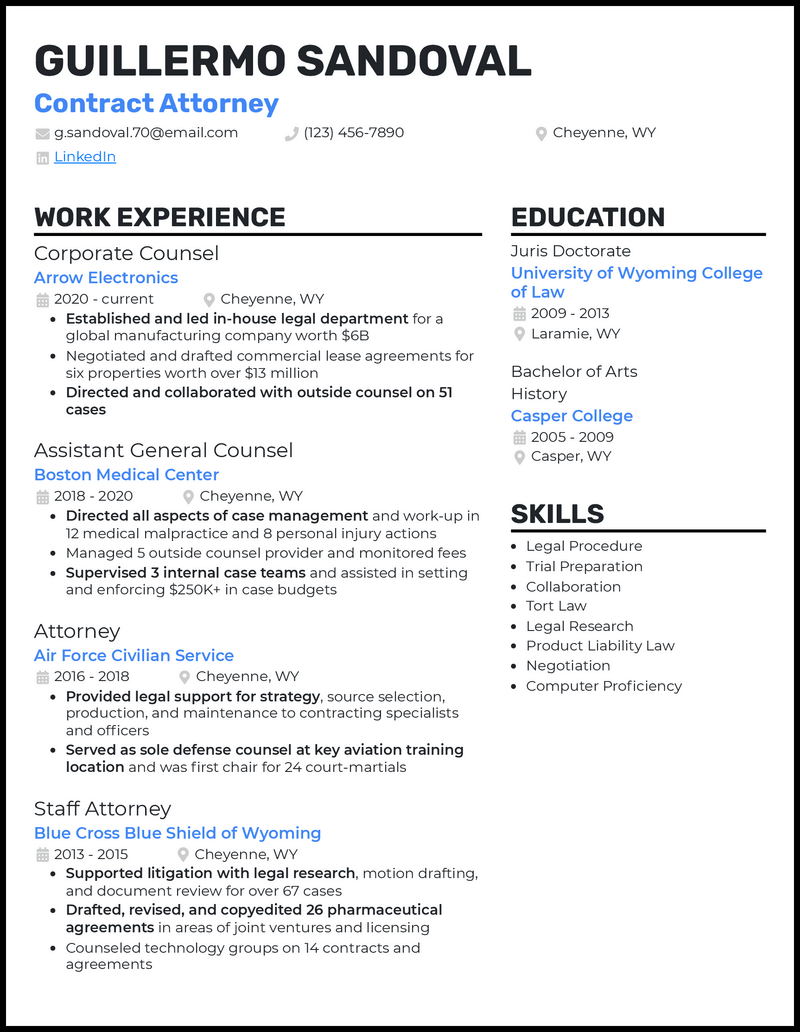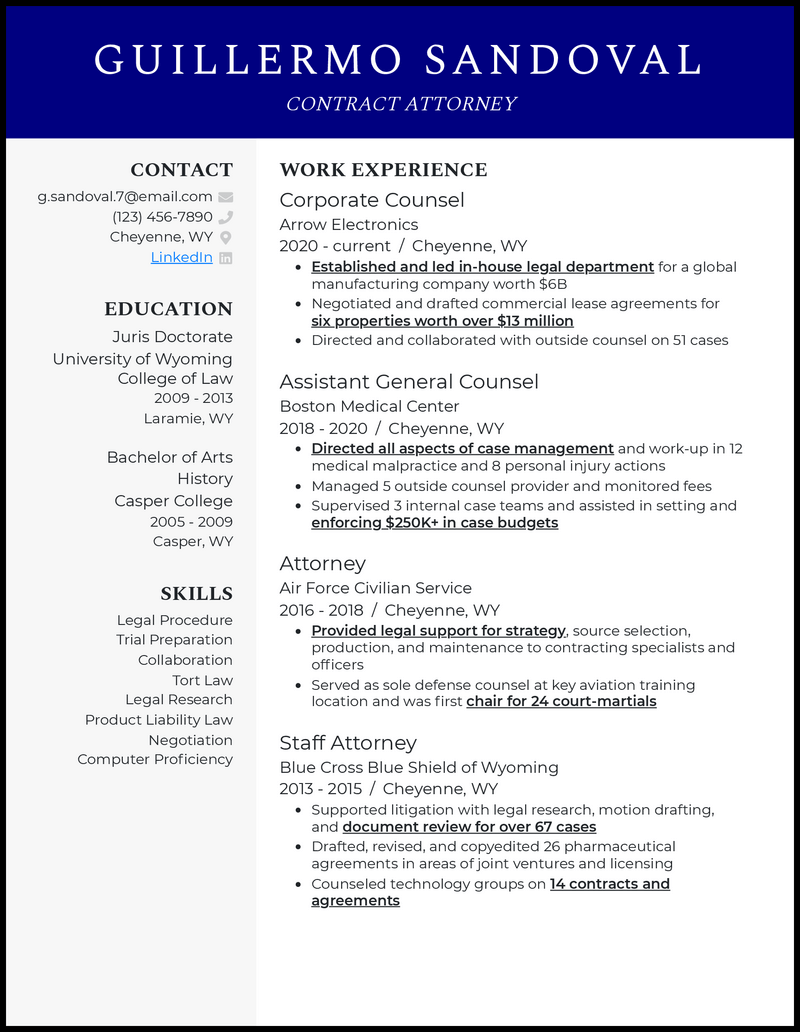The name says it all! You help clients with their legal contracts from start to finish. You likely begin the contract draft, review it, then collaborate with both parties to negotiate as needed and ensure all sides are happy!
But, no matter how many contracts you’ve written, the job hunt can be a different best altogether. Maybe you’ve looked through resume samples until you’re blue in the face and find yourself overwhelmed. What should you focus on? How should everything look?
Get ready to roll: We’ve got three resume templates that have helped contract attorneys like yourself many times, coupled with some time-tested resume advice and a free ai cover letter generator to help you start!
Related resume examples
What Matters Most: Your Skills & Experience Sections

Skills on a resume are one of the first things recruiters look at since they provide a nice, quick overview of what you can do. That means you want to make them count by listing no-nonsense abilities that reflect your contract specialization.
Recruiters already expect the basics, like communication skills and the ability to handle simple document editing software like MS Word. So, to add much more value to your resume and leave a more lasting impression, get specific!
List programs by name, but opt for less-common ones that demonstrate your abilities within your niche, and make sure that anything you include is profession-specific!
Here’s what we mean:
9 Top contract attorney skills
- Legal Procedure
- Legal Research
- Negotiation
- Case Collaboration
- Tort Law
- Product Liability Law
- Google Suite
- Document Drafting
- Trial Preparation
Sample contract attorney work experience bullet points
That skills section is looking great! But recruiters are eager to see what’s next in your experience section: How did you use those skills in the legal office or courtroom?
The whole idea behind each bullet point in your resume’s experience section is to spotlight an accomplishment—a little snippet of the difference you’ve made in your field. It’s all about the positive impact you left!
And how do you measure that impact? With quantifiable metrics of successful outcomes you’ve created, of course! Providing numbers like satisfaction rates and dollar savings makes you look more credible.
Here are a few samples:
- Supervised three internal case teams and assisted in setting and enforcing $249K+ in case budgets
- Established and led in-house legal department for a global manufacturing company worth $64.7B, increasing budget savings by 8%
- Provided legal support for strategy, source selection, production, and maintenance to contracting specialists and officers to increase satisfaction ratings by 14%
- Negotiated and drafted commercial lease agreements for six properties worth over $13.2 million, increasing client satisfaction by 16%
Top 5 Tips for Your Contract Attorney Resume
- Avoid “floating metrics”
- By “floating metrics,” we mean numbers that don’t add any real power to the impact of your final result. So, if you have an experience point that lists a random number of cases or headcounts that doesn’t strengthen your point, look for a stronger metric to use (like a percentage of successful cases).
- Don’t use a summary or objective unless necessary
- Honestly, most of the time, these truly aren’t necessary: Your experience points tend to speak for themselves! If you feel less than confident about your experience, make sure your bullet points delineate accomplishment (like hard-won negotiation) and not a regurgitation of job duties.
- Vary that context, too!
- Use a robust and well-rounded variety of experience points to ensure your resume is engaging and provides intrigue. Context will spruce things up as a contract attorney; use a brief backstory, such as who you supervised to set and enforce a budget or what kind of lease agreement you negotiated, to set off metrics.
- Stick to one page
- You really, really shouldn’t go over one page with your resume, no matter how incredible you are at leading an in-house legal department for a global company. But luckily, you can simply set your favorite selling points aside for your cover letter, where you can dive into greater detail.
- Save some for the interview!
- Once the recruiter skims your one-page resume and attorney cover letter, you’ll still want some extra materials left to bring to the interview! Again: Don’t try to over-pack your resume with points. Hold back some special cases you’d be comfortable discussing with an interviewer.
Revisit the job description! There’s bound to be requirements like contract niches or legal research areas that already overlap with your skill set. Provided they’re true for you, switch these out in each resume to show that you align with the job role.
Have you done due diligence by proofreading for errors and typos? Use one of our sleek resume templates to set off your unique qualifications so that they look their best. And stick with simple, readable colors and fonts.
As long as you’ve achieved the education level necessary for a contract attorney role, just about any other degree should be able to tie in somehow! Even if it’s not directly relevant to a litigation role, a degree like business or fine arts can show that you’re well-rounded and more than you seem.
List your Juris Doctor first and you can add less relevant degrees beneath that.




![3 Contract Attorney Resume Examples & Templates [Edit Free]](https://beamjobs.wpenginepowered.com/wp-content/uploads/2023/03/contract-attorney-elegant-resume-example.png)



